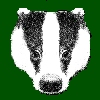 |
www.badgerland.co.uk |
| News about Badgers in the UK |
| Home | Shop | Animals | Pictures | Help | Seeing | Groups | Education | News | Search | Books |
| Badgerland | External | 2010 | 2009 | 2008 | 2007 | 2006 | 2005 | 2004 | 2003 | 2002 | 2001 | 2000 | 1999 | 1998 | 1997 | 1996 |
|
|
|
Policy may have spread cattle TB
14 Dec 2005 - BBC NewsBy Richard Black - Environment Correspondent, BBC News websitePolicy has been to cull badgers in areas near a TB outbreak; but new research says this spreads the disease because remaining badgers roam further. It suggests that to be effective, culls must be widespread and thorough. ... The Randomised Badger Culling Trial, also known by its acronym RBCT or "the Krebs trial" has already shown that the established approach of "reactive culling" near outbreak farms increased the incidence of bovine TB by 25%; whereas "proactive culling", aiming to kill all badgers in the area, brought the rate down by 19%. A new scientific paper published in the journal Nature looked at farms just outside the proactively culled areas. "What we demonstrate is a 19% reduction inside culled areas, but an increase of 29% in surrounding areas," said Professor Christl Donnelly from Imperial College London. "From that we demonstrate that a single policy could simultaneously benefit some herds and be worse for others," she told the BBC News website. The other scientific paper, from the Journal of Applied Ecology, attempted to find a reason why culling has these apparently contradictory effects. According to study leader Rosie Woodroffe from the University of California at Davis, the key is that badgers expand their ranges when adjacent setts are culled. "Everywhere where there is an impact on badger density there is also an impact on ranging," she told the BBC News website, "with animals travelling much more widely - not only in culled area but in adjoining areas. In reactively culled areas and around the borders of proactively culled areas you end up with not many fewer badgers, but with them travelling much further. I believe this can account for the findings in the Krebs trial." Professors Woodroffe and Donnelly are both members of the Independent Scientific Group on Cattle TB, the government's advisory panel. Habitat is undoubtedly a major reason; but Rosie Woodroffe believes the reactive culling policy may be another. "It could have contributed to the spread of bovine TB," she said. "The strategy was never formally tested so we can't know; but it's certainly plausible it would have made things worse." Now farming minister Ben Bradshaw is poised to announce a change of policy which is almost certain, whatever choices he makes, to bring opprobrium from one side or other of a highly charged debate. "Badgers are not the main source of TB in cattle," said Colin Booty, senior scientific officer of the RSPCA, which is resolutely opposed to culling. "The trial results show that killing large numbers of badgers - most of which are disease-free - may even make the disease situation in cattle worse. Such a policy would clearly not be sustainable." ..... For more information, please click the following link:
|
|||||||||||||||||||||||||||||||||||